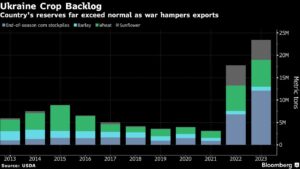A prolonged military conflict in the Middle East could potentially upend key commodity markets due to Iran’s control of the Strait of Hormuz, one of the world’s most important trade…
Ukraine, Russia Sign Black Sea Grain Export Deal
Reuters writers Ezgi Erkoyun, Ece Toksabay and Max Hunder reported on Friday that, “Russia and Ukraine signed a landmark deal on Friday to reopen Ukrainian Black Sea ports for grain exports, raising hopes that an international food crisis aggravated by the Russian invasion can be eased.
“The accord crowned two months of talks brokered by the United Nations and Turkey, a NATO member that has good relations with both Russia and Ukraine and controls the straits leading into the Black Sea.”
The Reuters article explained that, “Senior U.N. officials, briefing reporters on Friday, said the deal was expected to be fully operational in a few weeks and would restore grain shipments from the three reopened ports to pre-war levels of 5 million tonnes a month.
“Safe passage into and out of the ports would be guaranteed in what one official called a ‘de facto ceasefire‘ for the ships and facilities covered, they said, although the word ‘ceasefire’ was not in the agreement text.
“Though Ukraine has mined nearby offshore areas as part of its defences against Russia’s five-month-old invasion, Ukrainian pilots would guide ships along safe channels in its territorial waters, they said.”
Erkoyun, Toksabay and Hunder added that, “Monitored by a Joint Coordination Center based in Istanbul, the ships would then transit the Black Sea to Turkey’s Bosphorus strait and proceed to world markets, U.N. officials said.”
Financial Times writers Laura Pitel and Max Seddon reported on Friday that, “But with fighting continuing in Ukraine and deep mistrust between the two sides, diplomats warned that upholding the deal would present huge challenges.
“[UN secretary-general António Guterres] said the agreement would ‘bring relief for developing countries on the edge of bankruptcy and the most vulnerable people on the edge of famine’ by helping to stabilise global food prices.”
“It is unclear how the deal will be enforced and what will happen if either side is accused of violating it,” the FT article said.
Also Friday, Bloomberg writers Megan Durisin, Aine Quinn, and Alberto Nardelli reported that, “Yet even now with the accord, it will take time for traders and officials to kick-start the flows. Ukraine faces the task of clearing a pathway in mined seas, finding enough ships to carry the backlogged grain and re-routing trains and trucks that are now being used elsewhere. Getting insurance to cover operations is a challenge, too.”

And Wall Street Journal writers Alistair MacDonald and Will Horner reported on Friday that,
The deal between Moscow and Kyiv to allow for the export of Ukrainian grain is helping push global prices lower, but it won’t translate into a slug of new exports soon.
The Journal article pointed out that, “Grain analysts expect that even with Friday’s deal, it could take weeks for Ukrainian ports to be cleared for safe navigation and for grain shipments to begin flowing again. And Russia and Ukraine must remain committed to the deal—not a foregone conclusion amid the vagaries of the ground war and the parallel economic war being waged between Moscow and the West.
“It is also unclear how eager global shipping firms will be to load Ukrainian grain in the first place, despite assurances that both sides are committed to keeping ships and crews safe. Assuming exports do start to move out of ports affected by the deal, they will likely be at levels far below those before the war.”
Also Friday, Wall Street Journal writer Carol Ryan reported that, “Grain inventories are lower than they have been in recent years. The world’s stock-to-use ratio of key grains including wheat and corn—a measure of inventories as a share of annual demand—is projected to fall to 29.8% this year from 30.7% previously, based on data from the Food and Agriculture Organization of the United Nations.
“A deal should prevent a food crisis and social unrest in countries that rely heavily on Ukrainian imports—typically emerging economies whose consumers spend a bigger share of their income on eating. But shoppers in the U.S. and Europe can’t expect to see any immediate impact on their grocery bills.”
Matina Stevis-Gridneff, Valerie Hopkins and Dan Bilefsky reported on Friday at The New York Times Online that, “The deal seemed unlikely just two weeks ago, considering the deep mistrust between the warring parties and the apparent dearth of incentives for Russia to sign off on it. But part of the United Nations’ work focused on convincing private-sector shipping and insurance companies that they could transport Russian foods and fertilizers out of Russia without running afoul of United States and European Union sanctions.”
Wall Street Journal writer Jared Malsin reported Friday that, “The deal between the three Black Sea neighbors and the U.N. is in effect for a period of 120 days, which can be renewed, a senior U.N. official said.”
Reuters writer Michelle Nichols reported on Friday that, “The United States will work to hold Russia accountable for implementing a U.N.-led deal agreed on Friday to resume Ukraine’s Black Sea grain exports, said U.S. Ambassador to the United Nations, Linda Thomas-Greenfield.”
And Dow Jones writer Kirk Maltais reported Friday that, “Wheat prices fell on Friday after Russia and Ukraine reached a deal to resume Ukrainian grain exports via the Black Sea.
“In trading on the Chicago Board of Trade Friday, the most-active wheat futures contract fell 4.7%, to $7.68 per bushel, headed toward its lowest close since February, before Russia began its military operations in Ukraine.”





